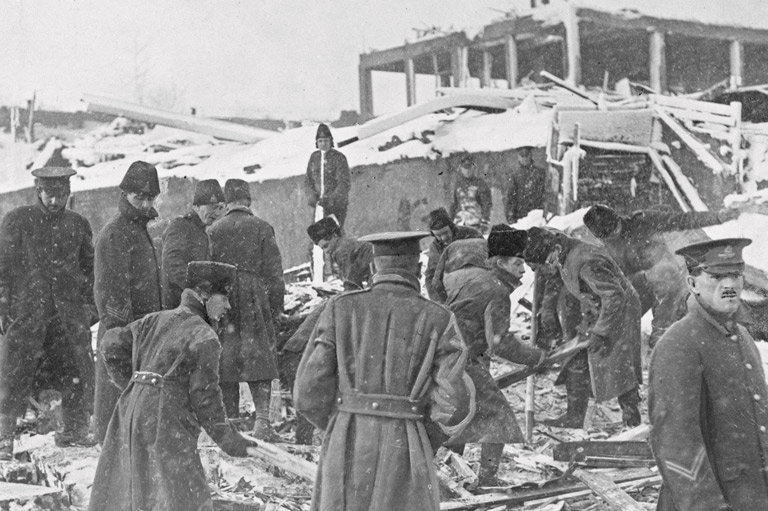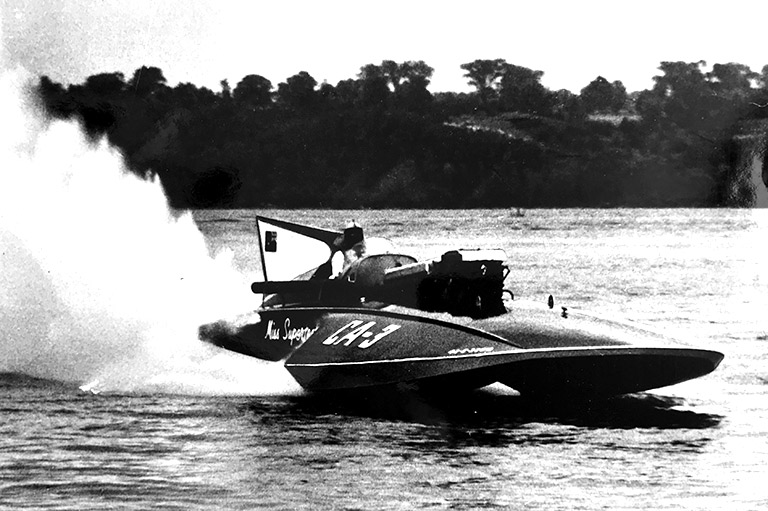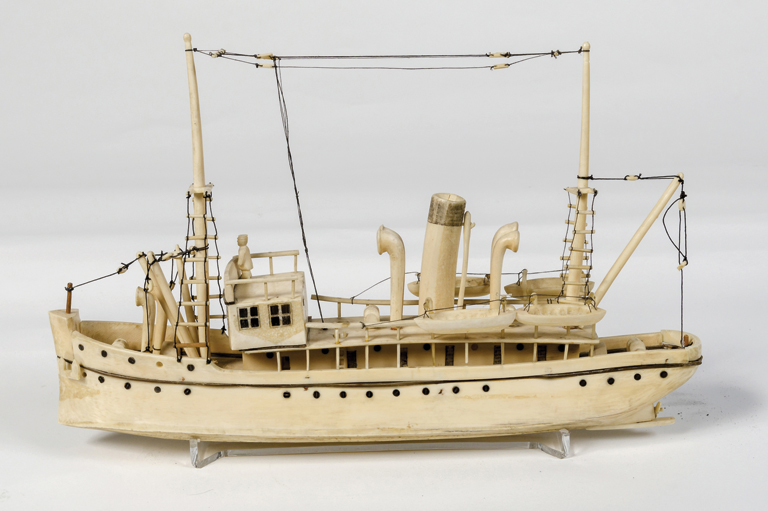Family Business
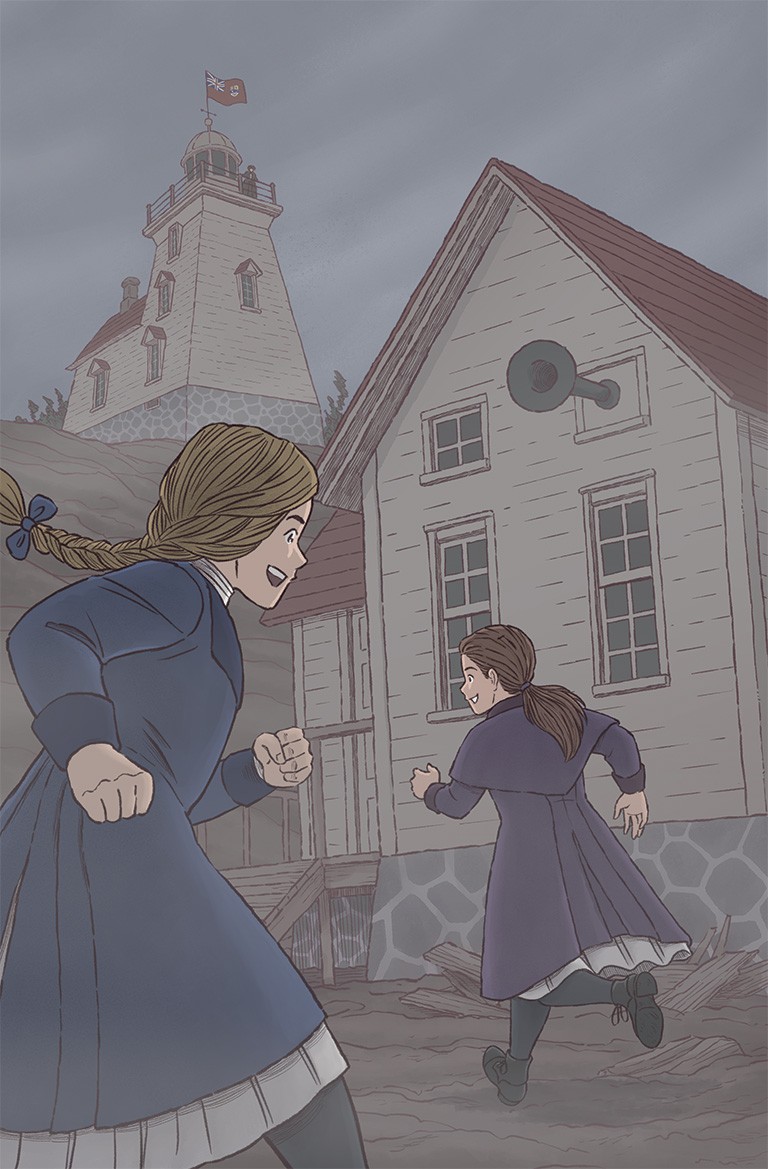
Discovery Island, B.C., 1899
Edith and May pretended not to hear their mother’s voice floating up to them from the rocky shore. Making a driftwood fort was much more fun, and they knew she’d just want them to help her paint the lighthouse.
May crawled into the nearly finished shelter. “Maybe we can bring quilts and sleep here some night.”
Edith looked out to the ocean. “Not tonight,” she sighed. “Fog’s coming.”
That’s why their mother had been calling them! The fort forgotten, the girls ran back toward Sea Bird Point.
“Sorry, mama!” Edith puffed when they burst into the neat white home attached to the lighthouse. But their mother was nowhere to be seen.
Their grandfather was sitting up on the chesterfield in the kitchen. Even that showed he’d made a big improvement. For most of the past few weeks he’d been too ill to do anything but lie down. “I wish I could help,” he said.
“It’s okay, grandpa,” May said. “Shall I make you a cup of tea?”
He smiled and shook his head. “I think you’d better see what your mother needs first.”
Just then the door opened and Edith and May’s mother came in, wiping the white paint off her hands with a rag. “There you are!” she said. “I’m going up to check the wick on the light. You two run over to the other building and make sure the fog signal is working. Ships will be counting on us tonight and we will not fail them.”
Her father pointed to his old raincoat. “Take that, Mary Ann. If you get wet, you’ll catch a cold.” He sighed. “And if you’re sick, then the girls and I are really in trouble.”
“Not to mention the sailors,” she replied tartly. Her face softened. “Don’t worry. I learned how to run this station from a good teacher. I remember everything you’ve shown me.”
She turned to the girls. “Go on now!” She gathered one daughter under each arm for a quick hug. “You look after your signal and I’ll look after mine.”
Edith and May grabbed their raincoats. As soon as they stepped outside, they could see the damp grey starting to close in around them. The waves now sounded soft and far away, and the sisters could only see a short distance ahead. Good thing they knew every rock and stump on the point.
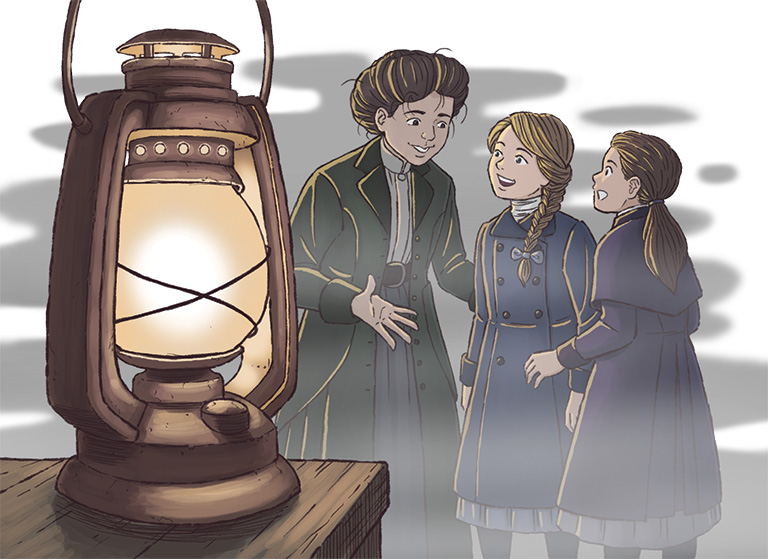
They took the path at something between a walk and a run. They’d been just little when the SS Premier had needed a signal on a foggy night, and for some reason, the horn hadn’t sounded. The Premier’s captain had brought the ship safely past the rocks, but it was a story that no one at the Discovery Island lighthouse ever wanted to repeat.
Would the path ever end? The fog was already making everything darker than usual, and evening would soon fall. All of a sudden, the building, with its big trumpet-like horn sticking out from what looked otherwise like an ordinary little house, loomed up in front of the girls. They ran up the wooden steps.
Inside, the coal fire soon chased the dampness away. It heated up the water until it turned to steam and pushed a long, low warning signal out through the fog and over the rocks and water. The sisters grinned at each other in relief. Some people thought foghorns sounded sad, but at this moment, it was the most beautiful thing they could imagine.
They settled in, waiting to make sure the signal continued to sound. Edith gazed out into the fog. “Do you ever dream of living in Victoria or Vancouver? We could go to an actual school instead of doing lessons by mail.” Her eyes grew dreamy. “And there’d be neighbour girls for us to play with and we wouldn’t have to help in the garden or clean the windows around the light.”
May shook her head. “I’d miss the waves and the birds and walking along the beach to see what’s washed up.”
The door opened and a ray of lantern light fell into the room in front of their mother. “I’m very proud of you girls. You’re such good helpers. I don’t know what I’d do without you.”
She picked up their coats. “The foghorn will be fine now, thanks to you. Let’s go have some supper.”
As they once again entered the fog, May whispered to Edith, “If you move to the city, I’ll come visit. But I’m going to be a lighthouse keeper just like grandpa and mama.”
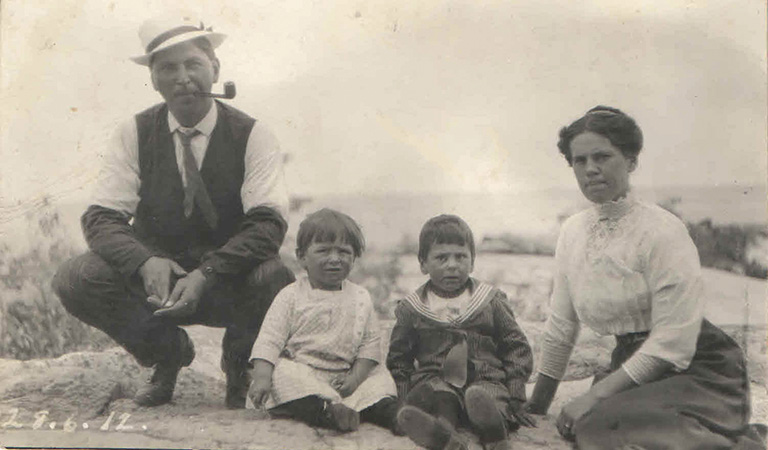
Everyone mentioned in this story is real. In 1886, Richard Brinn was named the first keeper of the lighthouse on Discovery Island. The island is a few kilometres east of Victoria, B.C., in what we now call the Salish Sea. His daughter, Mary Ann Croft, and her two daughters, Edith and May, lived with him. Croft helped Brinn run the station, and when he became ill, she took over.
After he died in 1901, she was given the job, becoming what’s believed to be the first woman lighthouse keeper in Canada. At first, she was paid $960 instead of $1,200 like the man who did the job on nearby Trial Island. In 1911 she complained, and her Member of Parliament raised her pay to the same level. She certainly did just as good a job. In 1908 an inspector wrote that Croft “kept the station in a highly creditable and efficient condition.”
Running a lighthouse was hard work. Keepers had to do more than just ensure the lights and foghorns were in good shape. They often had to grow and hunt their own food, as well as keeping track of weather and passing ships. They had to be able to go a long time without seeing anyone besides their own family, if they had one with them. School was usually too far away to go back and forth, so kids in lighthouse families often got their lessons by mail and sent them back the same way. They had to help out, but they also had freedom to explore.
Keepers weren’t needed on Discovery Island after the light was made automatic in 1996. The foghorn last sounded in 2004. The south part of the island is now a provincial park. The north part is overseen by the Songhees First Nation.
Themes associated with this article
Advertisement
You might also like...

Canada’s History Archive features both English and French versions of Kayak: Canada’s History Magazine for Kids.
Kayak: Canada’s History Magazine for Kids — 3 digital issues per year for as low as $13.99. Tariff-exempt!






